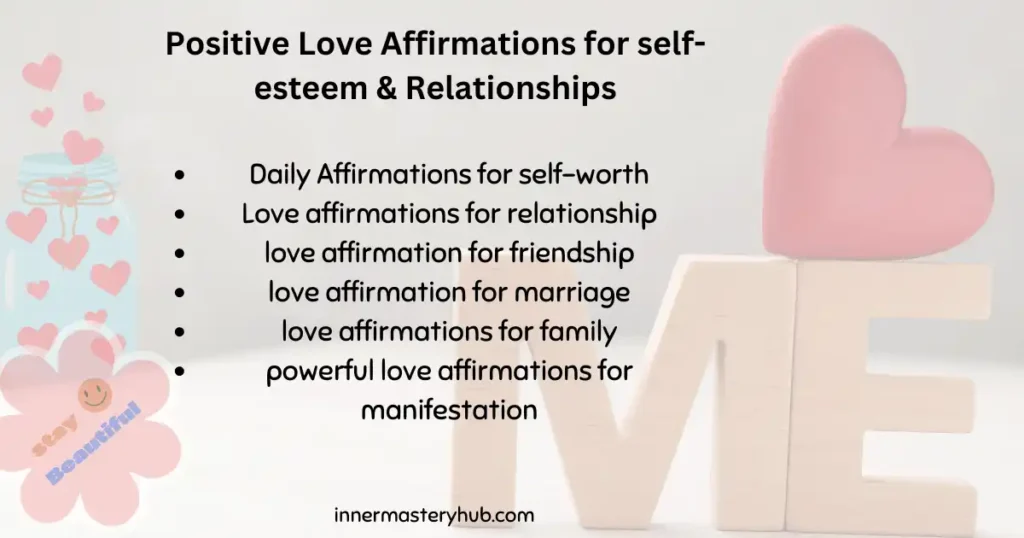11 Startegies To Find Your Worth After Years of Feeling An Inner Void

If you’ve been stuck in a cycle of feeling an inner void and telling yourself you’re not enough, it’s time to find your worth after years of inadequacy. You’re not alone, and you can move beyond those years.
1. Recognize the Root of the Feeling an Inner Void
You can feel undeserving because you internalised the idea that you didn’t measure up, failed, or were ignored at some point. It could have occurred in childhood, in a single relationship, or in a string of setbacks at work.
According to research, having “a generally negative overall opinion of oneself, judging or evaluating oneself critically, and placing a general negative value on oneself as a person” is a sign of poor self-worth. You start to let go of the notion that “I am not enough” when you realise that it is ingrained in your mind. You are now realising that you must discover your value as a right rather than as a goal.
2. Understand the Consequences of Not Valuing Yourself
Your relationships, your career, and your mental health are all gradually impacted when you don’t value yourself. Negative self-esteem “harms people’s ability to control their own lives and develop confidence in their ability to solve personal problems,”.
Additionally, those with higher self-esteem typically have better psychological health and social interactions. If you’ve been feeling inferior, you’ve probably missed out on chances, put up with mistreatment, and carried more emotional burdens than you should.
Take a moment to consider one aspect of your life when you secretly accepted less because you didn’t think you deserved more. Could you put it in writing? Your anchor will be that sincere moment.
3. Separate Worth from Achievement and Others’ Approval
Thinking you’re worthy solely if you succeed or if other people think well of you is one of the cunning traps. However, the actual value is not entirely dependent on external factors. Much of the value of self-worth originates from internal approval, even though self-esteem is linked to accomplishment and social success.
You will either keep waiting or bind your worth to erratic outcomes if you live your life waiting for someone else to tell you that you are worthy. The next step is to start convincing yourself that you are enough, even if you don’t “measure up” to your previous standards. “I deserve respect and kindness because I simply exist” is something you need to keep saying. Let this serve as your personal standard.
4. Acknowledge and Challenge Negative Self-Talk
Sayings like “I shouldn’t have messed up,” “I’m always behind,” and “Why bother—I’m not good enough” are examples of self-defeating behaviors. You need to confront these thoughts and replace them with ones that acknowledge your worth to boost your self-esteem.
Consider this: you would back off and argue it wasn’t fair if a buddy spoke to you the way you occasionally talk to yourself. Thus, you have to start advocating for yourself. This is your prompt: “Would I say this to someone I care about?” Stop when you hear yourself saying something hurtful. If not, make a change. Replace that with: “I may have made a mistake—but I am still deserving of kindness and respect.”
5. Use Your Body and Actions to Build an Inner Signal of Worth
Your physique, posture, and how you treat yourself are all manifestations of your beliefs. According to research, people’s self-esteem increases when they act in ways that show their importance. You change the internal wiring when you take a position, speak up, and make a decision that affirms your value.
Thus, start taking little actions that display your values, such as respecting your time, setting boundaries, and taking care of your body. This week, you may choose to do one thing, such as dedicating 15 minutes to yourself, saying “no” when you want to, or just gazing in the mirror and telling yourself, “I deserve good things.” Your beliefs will begin to align with your behavior as you act in accordance with your values.
6. Revisit Past Wounds and Rewrite Their Meaning
You’ve probably collected memories of failure, rejection, or shame if you’ve felt insufficient for years. “You’ll never be enough” is spoken in those memories. Permitting yourself to revisit those experiences, what you didn’t let yourself feel, and then reframe them to discover your value.
Life events can cause both positive and negative changes in self-esteem, so you can change how those events affect you. Pick one wound you bear and write it down in your journal. Describe how it influenced the “I’m not enough” narrative. Then change it to something like “That happened—but it doesn’t define my value” or “Because of that, I learnt this.” Continue until you notice a change.
7. Build Connections That Reflect and Respect Your Worth
Spending time with people who value you will boost your sense of self-worth. You may have put up with relationships where your worth wasn’t recognised if you’ve spent years feeling an inner void. Strong social support improves people’s sense of value and self-esteem.
It’s time to go over your circle. Are there those who constantly minimise your emotions? Are there folks who appreciate you for more than your work? Look for more of the latter. Choose one relationship that makes you feel better. Give it more room to identify whatever connection is draining you at that moment, and decide whether you can change the dynamic or let it go.

8. Set Goals That Reflect Your Values, Not Someone Else’s Script
If you’ve felt inadequate for years, you might have let social pressures or others’ expectations guide you rather than your own. However, to discover your value, you must set goals that are in line with your values and demonstrate to yourself that you are capable of pursuing the things that are most dear to you.
You become susceptible when you base your value on outside standards like competition, appearance, and approval. Say something like, “I chose this because I matter.” Put down one objective you’ve had that feels right for you. Divide it into a single, manageable step that you can do this week. The message is more important than the outcome: I value myself enough to pursue my goals.
9. Practice Self-Compassion and Permit Yourself to Be Human
You might treat yourself as severely as you would an enemy if you felt inferior. However, studies reveal that self-compassion is a potent ally in boosting self-esteem and lessening mental health issues. To be compassionate is to acknowledge that, despite your flaws and failures, you are still worthy of kindness and caring.
Start treating yourself with the consideration, tolerance, and support you might have anticipated from others. Do this exercise: Pause if you experience a surge of “I’m not good enough.” Inhale deeply. “It’s okay,” you tell yourself. I’m doing my best. I deserve to be loved and respected for who I am today. Give that some thought. Start wiring your internal conditions to reflect your values by incorporating them into your daily routine.
10. Celebrate Small Wins and Acknowledge Growth
You tend to overlook your Growth after years of feeling an inner void. You may hold off on feeling worthy until you achieve a significant victory or breakthrough. However, acknowledging each step you take affirms your worth. How you treat yourself, both when you succeed and when you fail, affects your sense of self-worth.
The outcome is not the only thing that matters. Therefore, you must develop the practice of celebrating. Write down anything you did at the end of each day this week that shows self-care, self-respect, or even a tiny improvement. Saying “no,” speaking up, or taking care of your body could be all it takes. Every note is a brick in the foundation of your value.
11. Commit to the Long-Term Journey of Worth
Discovering your value is a continuous process. It takes time, perseverance, and consistency to change the narrative if you’ve spent years feeling an inner void. Self-esteem and, consequently, self-worth are formed over time and impacted by a variety of life events; transformation is possible, but it takes time.
Therefore, you must see this as a journey with ups and downs rather than a destination you arrive at and then forget about. “I will keep showing up for myself, day after day, until believing in my worth becomes natural” should be your pledge. Put it in a visible place. When you start to feel unstable, go back to the previous steps. You’ll eventually reflect on your past and question why you ever thought you were inferior.
Finding your worth after years of feeling an inner void is a strong decision that gives you the freedom to treat yourself how you deserve. You’ve examined the consequences, admitted where you’ve been, and begun taking back control of your voice. Every one of the actions above is a means of advocating for yourself, speaking your worth into existence, and living in accordance with the reality that you are essential. You are more than prepared to take this journey.
FAQs on “Find Your Worth”
What does it mean to find your worth?
It means recognising your inherent value independent of what you do, what others say, or what you achieve.
Why might I feel like I don’t deserve good things?
Often, this comes from past experiences, repeated messages of inadequacy, or from linking your worth to achievement rather than to intrinsic value.
How can I tell if I have low self-worth or am feeling an inner void?
Signs include harsh self-criticism, fear of asking for what you deserve, avoiding challenges because you feel you won’t measure up, and tolerating poor treatment.
Is self-worth the same as self-esteem or confidence?
No. Self-worth is about your deep sense of value just for being you; self-esteem is how you evaluate yourself; confidence is belief in your abilities.
Can I improve my self-worth even after years of feeling an inner void?
Yes, self-worth can be developed with consistent effort, reflection, and new empowering habits.
What role do relationships play in my sense of worth?
Healthy relationships reflect your value and reinforce your sense of worth, while toxic ones can weaken it.
How do you stop relying on external validation in finding your worth?
Notice when you seek approval, reconnect with your values, and practice self-acceptance through actions that affirm your worth.
What’s the best mindset for someone feeling an inner void?
A growth mindset helps you see worth as inherent rather than earned and encourages compassion when you make mistakes.
How do I respond when I slip back into feeling an inner void?
Acknowledge the feeling, challenge the thought, remind yourself of your value, and take one small self-respecting action.
How long does it take to find your worth truly?
There’s no set timeline—building self-worth is an ongoing process of learning, healing, and self-acceptance.
What does finding your worth mean?
Finding your worth means recognizing your value, strengths, and uniqueness beyond external validation. It’s understanding that you deserve respect, happiness, and opportunities. It’s about self-acceptance, confidence, and setting boundaries that reflect your actual needs and identity.
How do I start finding my worth?
Start by reflecting on your strengths, achievements, and values. Challenge negative self-talk and stop comparing yourself to others. Practice gratitude, self-care, and affirmations. Surround yourself with supportive people who uplift you rather than drain your energy or confidence.






